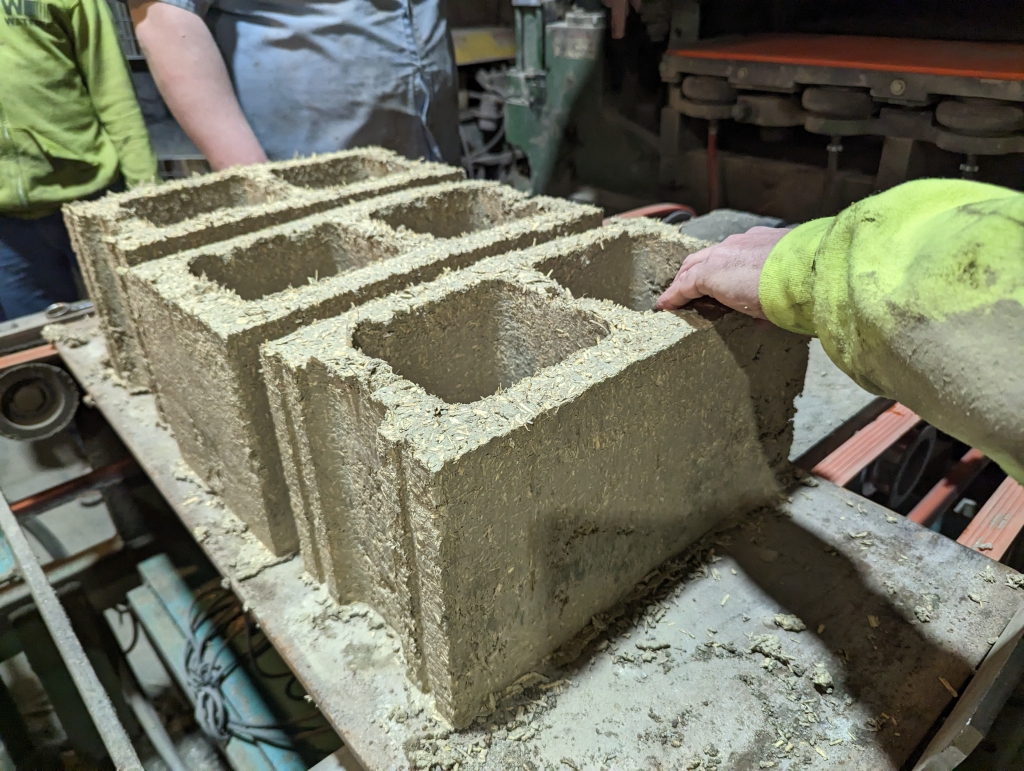Durham School of Architectural Engineering and Construction
Karl Vogel, March 31, 2023
Husker team develops revolutionary plant-based masonry blocks
NEW MIX MEETS BASIC CONSTRUCTION STANDARDS, OFFERS INCREASED SUSTAINABILITY OVER TRADITIONAL BLOCKS
A University of Nebraska–Lincoln College of Engineering research team has developed a plant-based mixture for concrete masonry blocks that are environmentally friendly and sustainable while helping to meet the world’s construction demands.

“There’s nothing else out there in the world like this — a load-bearing capable, hemp-based composite,” said Marc Maguire, assistant professor in the Durham School of Architectural Engineering and Construction.
Maguire said the new mixture has the potential to radically change the construction industry because it’s lighter than traditional Portland cement but also meets the American Society for Testing and Materials’ standards for load-bearing masonry units for strength, water absorption and weight.
Additionally, Maguire said, testing of the material revealed it removed 102 pounds of carbon dioxide equivalents per square, about four times more than standard concrete mixes.
By mixing the fibrous interior of the hemp plant stalk with a binding agent, the new composite is both sustainably sourced and could have immediate benefits on job sites.
“The weight of a cinder block can be a benefit and a curse,” Maguire said. “Engineers want that weight in a lot of construction applications, but it can have a physical impact on the masons who have to carry it around.
“We’re probably cutting 25% or so (of the weight), and that savings is probably enough to make the masons feel better but also keep the mass effect we need from the engineering and design standpoints.”
During spring break, Maguire’s team — whose research is supported by Global Fiber Processing and the Nebraska Department of Economic Development — used the facilities of Watkins Concrete Block in Omaha to fabricate 500 hemp-based blocks.
The team will use these hemp blocks to construct full-scale walls in the Durham School’s structures lab at Peter Kiewit Institute on Scott Campus to test the performance of the concrete in areas such as standing up to weather conditions, overall strength of the block and insulation capabilities.
Another manufacturer on the East Coast inquired about making a different type of masonry block, and Maguire said the team may “go up there and do a trial run.”
“Anytime you do something new, you have to work through the kinks,” Maguire said. “We’ll be complete with all of our work by the end of summer, but we’ll know well before that — probably in about a month — whether we’re going to be successful,” Maguire said.
The 2018 federal farm bill legalized the production of hemp and removed the plant and its seeds from the Drug Enforcement Administration’s schedule of controlled substances. In 2019, the Nebraska Legislature adopted a hemp farming act, establishing a statewide program for growing the plant. To date, hemp hasn’t yet established a consistent foothold in agricultural production and consumer demand.
The success of this new cement mixture, Maguire said, could provide an alternative crop for Nebraska’s farmers that could tackle the demands of an evolving construction industry. As more hemp is available, Maguire said, it would also drive down the cost of the new mixture to be even more competitive with the composites currently used in construction.
As news of his research spreads, Maguire is fielding phone calls and culling emails from interested builders, manufacturers and investors from all corners of the United States. But he’s pumping the brakes on that interest for now.
“Realistically, you’re not going to see blocks of our mixture available at Lowe’s or Menards soon,” he said. “We’ve got a while before this will be ready to scale up and take hold as part of the market, but we know there’s a demand for something better. We’re looking to provide that something better.”
Durham School of Architectural Engineering and Construction Engineering






